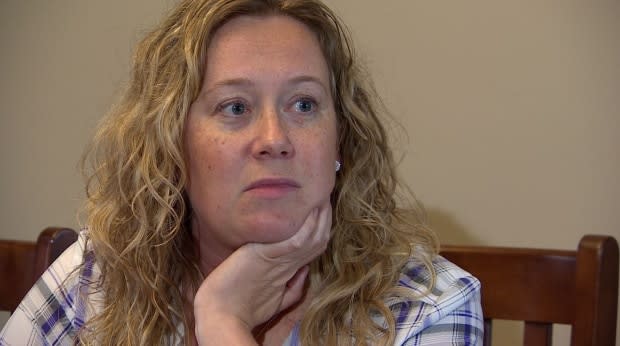'It's been a roller-coaster': Sask. nurse prepares for appeal after $26K penalty over Facebook post
It's been a tough four years for Carolyn Strom.
In 2016, the Prince Albert, Sask., nurse was found guilty of professional misconduct by the Saskatchewan Registered Nurses Association after a 2015 post she made on Facebook, criticizing the health care her grandfather received.
She was ordered to pay a $1,000 fine and $25,000 to cover the cost of the tribunal.
"It's been a roller-coaster," said Strom. "It's been really stressful. I didn't ever imagine that it would go on this long."
On Tuesday morning, Strom will be at the Saskatchewan Court of Appeal in Regina to fight the association's decision as well as a provincial Court of Queen's Bench decision that ruled against her last year.
The professional charges stemmed from a February 2015 Facebook post in which Strom criticized the care her grandfather received while in palliative care at St. Joseph's Integrated Health Centre in the town of Macklin, about 225 kilometres west of Saskatoon.
"It is evident that not everyone is 'up to speed' on how to approach end of life care ... or how to help maintain an aging senior's dignity (among other things!)," read part of the Facebook post.
"To those who made Grandpa's last year's less than desirable, please do better next time!"
Some of the nurses in the hospital felt Strom's post was a personal attack and complained. The SRNA ruled the post brought the nursing profession into disrepute and violated its social media policy.
Strom refused to drop the case and held to it as a matter of principle. She was ordered to write an essay explaining what she did wrong, and refused to do so.
She believes her case has had a chilling effect on other nurses speaking out across the province.
"My fear is that things aren't getting reported. Things aren't changing," she said.
"People are afraid to to address concerns, and that's not helping anybody, especially the people with family members that are in hospital."
'Don't speak out'
The case generated public outrage, with many advocates speaking out on Strom's behalf.
"If what she said is deemed by the regulator to be somehow crossing a line, then I think we're all in pretty deep trouble," said Steven Lewis, a Saskatoon-based health-care policy analyst.
"They're essentially sending the message, 'Don't speak out on anything.'"

Several groups, including the British Columbia Civil Liberties Association and the Canadian Constitution Foundation, have received intervenor status in the case, testifying on Strom's behalf.
Lewis noted that Strom's comment did not single out any particular person, and was talking about the care her grandfather received in a facility hundreds of kilometres away, not her individual workplace.
"If the message is that you can't criticize anything about the health-care system then, among other things, the public is deprived of an independent voice from within the profession," he said.
"If we're seeing, as a blanket principle, that no person who works in health care should be able to say anything publicly in a general way about the quality of care, then I think society is in pretty big trouble."
Public stain
However, the nurses association believes it's important that Strom be held to account.
In its court submission, the association said Strom should have taken any complaint through official channels and should never have talked about the situation in public.
"Even though she did not name names, a reasonable person who read the [Facebook] post could easily come to the conclusion that the majority of the small number of nurses who work at this institution are incompetent, lack compassion and don't care about their patients," read the submission.
"It is impossible for a person who works there to distance themselves from this stain."
The court document also said Strom never brought her concerns up to staff at the health centre, and staff could only remember a handful of times she had ever attended the facility.
"Do Canadians not care about professional reputations?" it read. "Is it not reprehensible to anyone to carelessly use your professional status to harm reputations without getting all the facts or following the proper channels?"
However, Strom's lawyer, Marcus Davies, said the legal challenge has far-reaching applications beyond his client's case, especially for anyone in a profession under professional regulations.
"There are sort of professional implications here for all of us, whether you're a lawyer, doctor or a chartered accountant," he said. "It's sort of an infringement on our rights by delegation."
Davies said the Court of Queen's Bench judge erred when he wrote that a professional body's decision should trump the court.
"We feel that in this case, a panel of nurses does not have the expertise in the Charter of Rights and Freedoms that the court has," he said. "The court should have exercised its discretion to test that."
The right balance
Keir Vallance, a law professor at the University of Saskatchewan, said courts have generally shown deference when it comes to rulings from professional bodies.
However, he also said the nurses association's decision could be seen as heavy-handed in this instance.
"The interesting question is whether the regulator found the right balance between their power to regulate their members' speech versus the right of nurses to speak their minds."
He said there's a good reason associations want to monitor what members say.
"You don't want, as an example, nurses spreading health disinformation or undermining confidence in the health-care system without some good reason," he said.
"The real question here is, did this particular regulator in this particular instance go too far? Did they go beyond what the public interest requires?"

